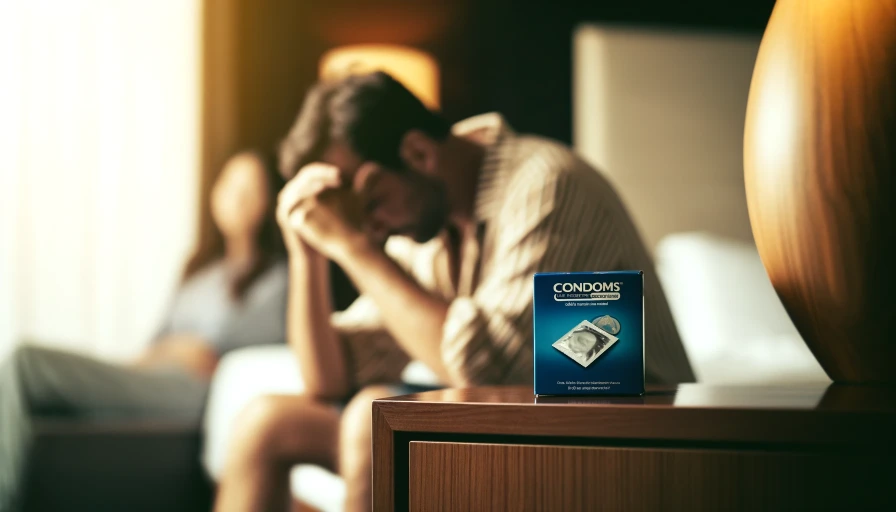
Talking about using condoms can be tricky. People often have strong feelings about them.
Some think condoms make sex less fun. Others believe different methods are just as good.
And a few think being good-looking means they don’t need to use condoms. This is a big problem because it leads to more STIs.
A study found that guys who think they are very good-looking don’t like using condoms.
This can lead to doing risky things, like suddenly taking off the condom without telling their partner (stealthing).
Not using a condom is not just about personal choice. It’s about looking out for both people’s health.
Condoms are a must in relationships where you’re not just seeing one person.
Even in serious relationships, it’s important to talk about what’s right for you as a couple. But always remember, respecting each other’s health is super important.
Key Takeaways
- A man’s self-perceived attractiveness can lead to a reduced likelihood of using condoms.
- Common rationales for avoiding condoms include pleasure enhancement, impressing partners, and reliance on other birth control methods.
- Different relationships require varying considerations for condom use, from casual encounters to monogamous partnerships.
- Actions suggesting refusal to wear condoms can often indicate underlying intentions or recklessness.
- Despite appearance or behavior, using protection is crucial, as STIs do not discriminate.
Introduction to Condom Usage
Many men don’t like using condoms. They have different reasons for not wanting to.
For example, some men find it hard to keep an erection when they put on a condom.
Others have trouble staying hard during sex because of it. These issues affect how men think about safe sex.
Putting on a condom can also make women less aroused. This slow-down makes it harder for some couples to enjoy sex safely.
Condom use has gone down to 16.4% lately, from 20.4% in 1995. But, condoms are highly effective when used perfectly.
They can protect against both pregnancy and STDs 98% of the time, says the World Health Organization.
It’s important to understand why some men don’t like condoms. This can help make sexual health better for everyone.
When thinking about safe sex, social and mental issues are as big as the physical ones.
Young people, who get a lot of new STIs, often use condoms well. But, there’s always more to do to promote safer habits.
Sensation and Comfort Factors
Lots of guys don’t like condoms. They worry about not feeling as good during sex.
Many studies show that men feel sex is not as fun with condoms. So, they might not use condoms all the time.
Altered Feeling During Intercourse
Guys often say condoms make it feel less. They feel like sex is less fun and more like a task.
But, condoms help prevent spreading diseases and unwanted babies. Still, most guys skip condoms because they don’t like how it feels.
Fit and Comfort
Fit and comfort are big reasons guys don’t use condoms. About 30% to 35% need smaller condoms, but these are hard to find.
Only 15% to 20% need bigger ones. So, not all condoms fit right, and this can make sex uncomfortable.
Some guys say excuses, like being too big or feeling fine without them. These reasons can make using condoms even harder.
If condoms are free or cheap, people may not bother to find the right size. Knowing about fit and comfort is key to solving this issue.
Psychological Barriers

Let’s think about why some men avoid using condoms. One big reason is how they see themselves.
Their confidence really changes what they think about using condoms.
Self-Image and Confidence
Some men believe that using condoms makes them look bad. They might feel like it takes away from their manhood.
This thought comes from what society and their own ideas tell them.
This makes some guys say no to condoms. But, it’s risky. The CDC says STIs like Chlamydia and gonorrhea are getting more common.
Young men, aged 20-24, need to be careful.
Social Perceptions
How people see condoms also affects why men avoid them. They think condoms show a lack of trust or too much sex. This wrong idea stops men from protecting themselves. And sadly, many don’t use condoms when they need to. For example, less than half of the younger men said they used a condom with a new partner.
These views are dangerous. They lead to many young people getting STIs. We have to change how we think about condoms and public health.
Influence of Partner Attractiveness
Partner looks matter a lot in deciding to use condoms. In a study, 51 guys rated the looks of 20 women from photos.
They wanted sex more with the prettiest women.
But, here’s the catch. If a woman was really good-looking, the guys thought less about using a condom (ppartner looks and condom decisions.
Also, guys who saw themselves as handsome thought others like them preferred sex without a condom (p=0.001). And they didn’t plan on using one either (p=0.02). But, planning and doing aren’t the same, hinting at deeper reasons behind partner attractiveness and condom use.
This info helps understand why some guys don’t like condoms. How cool they see their partner plays a big role. It can lead to making bad choices for immediate pleasure over safety.
Misconceptions About Safety and Efficacy
Many guys don’t like to wear condoms because they have wrong ideas about how safe and good they are.
They might think other ways of not getting pregnant or sick are just as good.
This can lead to them doing risky things when having sex.
Treating Withdrawal as an Alternative
Some guys think the pull-out method is as good as using a condom. But the pull-out way is not safe.
It doesn’t stop STIs and it’s not very good at stopping pregnancy. Condoms are 98% safe if you use them right.
Picking the pull-out method over condoms is a big mistake about staying safe during sex.
Trust in Partner’s Health
Guys often trust their partner’s health without checking. But many STIs don’t show any signs, so you can’t always tell if someone is sick.
This mistake makes having sex without a condom very risky. Remember, condoms work best when you always use them the right way.
They offer up to 99% protection from getting an STI or HIV.
Why do guys not like condoms?

Guys not using condoms has many layers to it. Some men don’t like how condoms feel.
They believe condoms make sex less enjoyable. About 28% may lose their erection putting one on.
While 20% might struggle to keep it up. This makes them avoid condoms altogether.
But, there’s more than just physical discomfort. The idea that birth control is a woman’s thing is wrong but still strong.
This idea lets men off easy, not feeling like they should also protect themselves. It stops both partners from doing their part.
Choosing not to use condoms comes with risks. Some opt for withdrawal, which is not very effective.
This can lead to unwanted pregnancies or catching an STI. The CDC says condoms are needed even with PrEP, as there are many STIs to worry about.
Our culture can also push men away from condoms. In some places, using condoms can make people think you’re loose or can’t trust your partner. This can make men focus on approval more than being safe.
But, health and safety are top priorities. In situations where one partner doesn’t want to use a condom, speaking up is crucial. It ensures everyone is okay with the choices made and respects each other’s well-being.
Impact of Cultural and Societal Norms
Certain things in culture affect how men think about using condoms. When people talk well about using condoms, risky sex goes down.
But, what people believe can make using condoms hard, even if they know they should.
Society plays a big role in safe sex too. In places where old-fashioned ideas about men and being friendly are strong, men talk less about using condoms. But, trying to change this, like fighting machismo, can help.
Men may talk less about condoms if they really like their partner or if they use drugs.
Also, thinking you should act tough can make you think bad things about condoms.
But, wanting to show off can make you see condoms as a good thing.
How much risky sex happens with Latino men changes because of emotions, the virus status of their partner, or using alcohol or drugs.
Looking at these things in studies meant getting info from places where the Latino community meets.
This makes the info better.
Many young people who get HIV are men. African American and Hispanic men are at more risk than others.
And, poor people more than rich people. We need to teach about cultural rights and condoms to make safe sex better for everyone.
Lack of Proper Education
Many young adults don’t know enough about safe sex. They often have sex without knowing the risks.
Shockingly, around 46% of sexually active high school students didn’t use condoms in 2013.
This lack of education shows in the high number of STD cases among teens and young adults.
Gaps in Sexual Health Education
Most U.S. high schools do not fully educate students about sex. Not many cover LGBTQ+ issues either.
Young people often make mistakes using condoms, showing they need more than basic info.
They need to practice using them and build their skills.
Misleading Information
Wrong ideas about condoms make things worse. Some think the pull-out method works, which is wrong.
This misunderstanding leads to more teen babies and STDs. Programs like Be Proud! Be Responsible! have shown teaching how to use condoms helps more than just talking about it.
We must do better in teaching about safe sex and clearing up myths. Studies show, teaching about condoms in school helps a lot.
It makes students more likely to use condoms right from their first time. This helps keep them healthy and prevents unwanted pregnancies and STDs.
Perceived Inconvenience
Some men don’t like using condoms because they find them inconvenient. They think putting on a condom interrupts the fun.
Around 15% say this stops them from using one.
It’s also thought that condoms take time and effort to get and use. You have to buy them and make sure you have them when you need them. Even though teaching the benefits of condoms helps, it’s still hard to get everyone to use them.
Condoms that don’t fit well also make things hard. If they’re not comfy, guys may not use them like they should.
This choice might put short-term fun above staying safe from diseases. So, less than half of young adults use a condom every time by the time they’re 16, because it feels like a hassle.
Helping people overcome the trouble with condoms is important. We need to make it easier to use them.
This way, we can lower the number of STDs in young men.
Influence of Spontaneity and Heat of the Moment
Spontaneity can lead us to act quickly, perhaps choosing not to use condoms.
This is to keep the moment passionate and free. But, does this choice really affect condom use?
Impulse and Risk-Taking Behavior
In the heat of the moment, safety might be the last thing on our minds. A study, MINTS-II, found that 85% of the people didn’t use a condom the last time.
They preferred the joy now over potential health risks later. This shows that acting on impulse can lead to risky decisions, especially when things are exciting.
Intimacy and Passion
Many couples decide to skip condoms to make their moment together more intimate.
Research shows that 28% of men have trouble with condoms, and 20% can’t keep their erection.
Also, 30% of women feel less turned on because of the break to put on a condom. This often leads them to choose passion over protection.
Still, it’s important to balance passion and safety. By having condoms on hand and self-control, health doesn’t have to be at risk even when being spontaneous.
Conclusion
Many men don’t like using condoms because of how they think, what they are taught, and their culture.
With more STIs happening, especially in men ages 20-24, it’s key to know why they don’t like using condoms.
Almost half of STIs happen to young people, pointing out a big problem.
Though some young adults plan to have babies, only around half of men 18-29 use condoms with casual partners.
But, over 80% of young teens do use them. This shows we’re not teaching about safe sex well enough.
What men think about condoms really affects whether they use them or not.
If they see more good in using condoms than bad, they’ll likely use them more.
But if they see mostly bad things, they won’t want to use them. This shows how important it is to change how people think about condoms.
In 2006, over half of new HIV cases in the USA were in Men-who-have-Sex-with-Men.
Shockingly, 85% of these men didn’t use condoms last time they had sex. This is a major concern.
But, teaching men about the good things condoms bring can help increase their use, as shown in some studies.
So, getting men to like condoms more needs a full plan. We must work on their thoughts, what they learn, and their cultural views.
By talking about safe sex more and making condom use normal, we can make things better for everyone.
Frequently Asked Questions
Why do guys struggle with condoms?
Some men may struggle with condoms due to a lack of experience, improper sizing, difficulty maintaining an erection while putting on the condom, or psychological factors such as anxiety or reduced sensitivity.
Are condoms less pleasurable for men?
Some men report reduced sensitivity and pleasure when using condoms, but this varies greatly among individuals. Finding the right size, type, and material of the condom can help improve the experience.
What does it mean when he stops using condoms?
If a partner stops using condoms, it could mean they feel comfortable with the current level of trust and sexual health in the relationship. However, it is important to have an open discussion about this decision to ensure mutual consent and understanding.
What do I do if my partner doesn’t like condoms?
If your partner doesn’t like condoms, communicate openly about the importance of protection against sexually transmitted infections (STIs) and unintended pregnancies. Consider exploring different types and brands of condoms, or talk to a healthcare provider about alternative methods of contraception and protection.
Is it a red flag if a guy doesn’t have condoms?
Not having condoms might indicate a lack of preparedness or concern for safe sex practices. It is important to communicate your expectations regarding safe sex and ensure both partners are responsible for protection.
Can guys feel when condoms break?
Some men may feel a condom break during intercourse due to a sudden change in sensation, but not always. It is crucial to check the condom before and after use to ensure it is intact.
Why do my boyfriend’s condoms keep breaking?
Condoms can break due to a variety of reasons, such as using the wrong size, expired condoms, improper storage, or lack of lubrication. Ensuring proper use and choosing the right type of condom can help prevent breakage.


